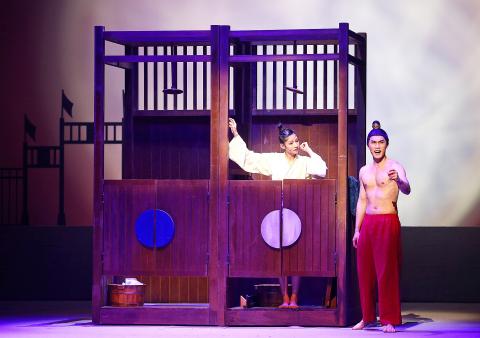Ten years after its debut as a National Taiwan University theater department production, Mulan the Musical (木蘭少女), Taiwan’s most successful Broadway-style musical export, is packing them in at National Theater in Taipei as part of a new tour to celebrate its anniversary.
The show opened on Saturday last week and runs through Sunday.
Created by three wunderkinds, including two of the leading lights of the Tainaner Ensemble (台南人劇團) — playwright/director Tsai Po-chang (蔡柏璋) and Lu Po-shen (呂柏伸) — alongside Owen Wang (王希文), founder of theater company Studio M, the retelling of the story of the legendary woman warrior from China’s Northern and Southern dynasties period, Hua Mulan (花木蘭).

Photo: CNA
Tsai first wrote Mulan as a stage play, which took first prize in a literary contest organized by the Tainan City Cultural Affairs Bureau in 2007.
The original Chinese Ballad of Mulan, or poem, was a morality tale about the virtues of filial piety, with Mulan deciding to take the place of her father in the army when each family is obligated to send one male to serve: Her father is elderly and her brother is too young. She wants to make a name for her family and serves 12 years without her fellow soldiers realizing she is a woman.
However, Tsai decided to shake the story up and give it a Taiwanese twist, even though the musical version would retain costumes designed to reflect historical outfits.
In his retelling, Hua Mulan is no eager heroine, she is more interested in the easy life of shopping. However, it comes down to a choice between her, her younger brother who is gay, and her sister, who has an illegitimate child. Needless to say, Mulan is forced to enlist.
In the army, she faces several battles, and not just from China’s enemies. While struggling to keep her true identity hidden, she has to deal with a pair of would-be suitors: a childhood friend who does not recognize Mulan, falls for her even though he is straight, as well as a gay general.
Tsai’s script pokes fun at Taiwan’s military culture and family life, and raises questions about gender identity and having children outside of wedlock. The script was designed to invoke laughs, but also inspire thought.
Tsai brought Wang onboard to help turn his play into a musical for National Taiwan University’s Department of Drama and Theatre’s 10th anniversary.
Wang’s original score used rock, rhythm and blues, Chinese folk music plus some jazz and classical influences to create a score of catchy tunes and dance numbers, although for this latest version he did some rearrangements and amped up the pop side in a bid to appeal to younger audiences.
This anniversary production, which wowed audiences in Singapore during a two-month run and in Taichung last month, features two former participants in the One Million Star (超級星光大道) singing contest, Nana Lee (李千娜), Hua Mulan, and Chou Ting-wei (周定緯), at the head of a 26-member cast.
Wang will be conducting the orchestra for the shows.

The canonical shot of an East Asian city is a night skyline studded with towering apartment and office buildings, bright with neon and plastic signage, a landscape of energy and modernity. Another classic image is the same city seen from above, in which identical apartment towers march across the city, spilling out over nearby geography, like stylized soldiers colonizing new territory in a board game. Densely populated dynamic conurbations of money, technological innovation and convenience, it is hard to see the cities of East Asia as what they truly are: necropolises. Why is this? The East Asian development model, with

June 16 to June 22 The following flyer appeared on the streets of Hsinchu on June 12, 1895: “Taipei has already fallen to the Japanese barbarians, who have brought great misery to our land and people. We heard that the Japanese occupiers will tax our gardens, our houses, our bodies, and even our chickens, dogs, cows and pigs. They wear their hair wild, carve their teeth, tattoo their foreheads, wear strange clothes and speak a strange language. How can we be ruled by such people?” Posted by civilian militia leader Wu Tang-hsing (吳湯興), it was a call to arms to retake

This is a deeply unsettling period in Taiwan. Uncertainties are everywhere while everyone waits for a small army of other shoes to drop on nearly every front. During challenging times, interesting political changes can happen, yet all three major political parties are beset with scandals, strife and self-inflicted wounds. As the ruling party, the Democratic Progressive Party (DPP) is held accountable for not only the challenges to the party, but also the nation. Taiwan is geopolitically and economically under threat. Domestically, the administration is under siege by the opposition-controlled legislature and growing discontent with what opponents characterize as arrogant, autocratic

When Lisa, 20, laces into her ultra-high heels for her shift at a strip club in Ukraine’s Kharkiv, she knows that aside from dancing, she will have to comfort traumatized soldiers. Since Russia’s 2022 invasion, exhausted troops are the main clientele of the Flash Dancers club in the center of the northeastern city, just 20 kilometers from Russian forces. For some customers, it provides an “escape” from the war, said Valerya Zavatska — a 25-year-old law graduate who runs the club with her mother, an ex-dancer. But many are not there just for the show. They “want to talk about what hurts,” she